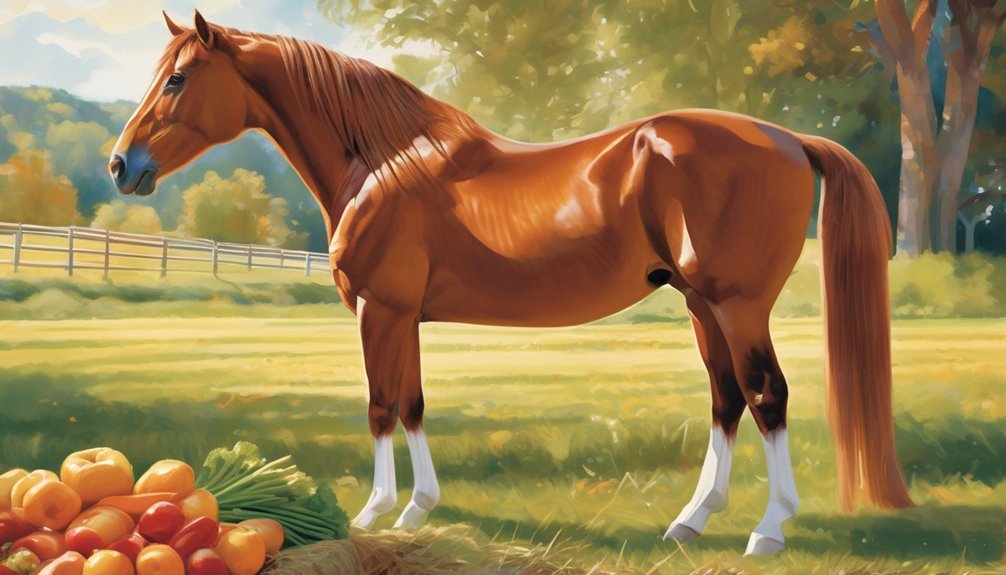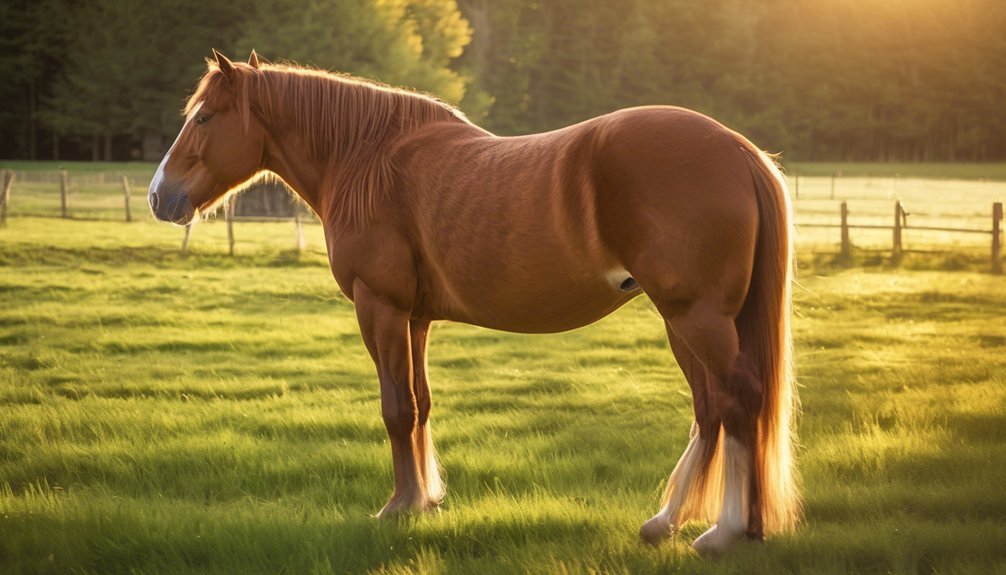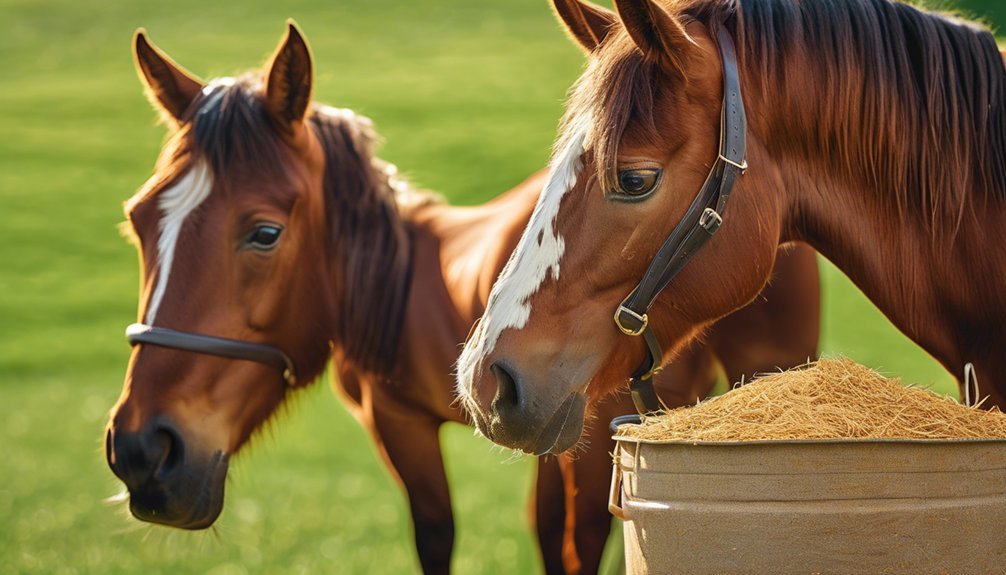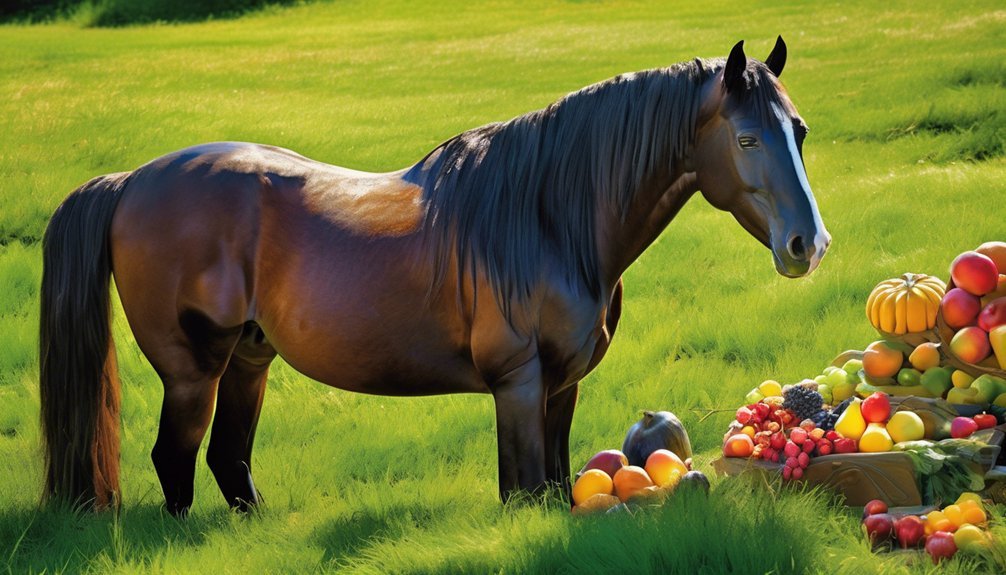
Your horse's coat is a direct reflection of its overall health, and diet plays a pivotal role in this. Providing quality forage is just the beginning; essential fatty acids, vitamins, and minerals are crucial for maintaining that glossy sheen. Understanding the specific nutritional needs of horses can help you avoid common deficiencies that impact coat quality. What specific dietary choices can enhance your horse's coat condition? The answer may surprise you.
Key Takeaways
- Quality forage is essential for a horse's overall health and contributes significantly to coat quality.
- Omega-3 fatty acids from sources like flaxseed oil enhance coat shine and reduce skin irritation.
- A balanced intake of vitamins and minerals, particularly zinc and selenium, supports skin health and coat integrity.
- High-quality grains and protein sources promote hair growth and strength, impacting the coat's appearance.
- Regular supplementation can address nutrient deficiencies, leading to a glossy, healthy coat.
Understanding the Nutritional Needs of Horses

Understanding the nutritional needs of horses is crucial for maintaining their overall health and ensuring a shiny, vibrant coat. Achieving nutritional balance involves providing a well-rounded diet that meets their energy, protein, vitamin, and mineral requirements.
Quality forage, such as hay or pasture, serves as the primary dietary source, supplying essential fiber. Additionally, grains can enhance energy levels, while supplements may fill any nutritional gaps.
You should also consider the importance of specific vitamins and minerals, like biotin and zinc, which play key roles in coat health. Regularly assessing your horse's body condition and adjusting their diet accordingly will help you maintain optimal health.
Ultimately, a thoughtful approach to nutrition fosters a beautiful, healthy coat that reflects your horse's overall well-being.
Essential Fatty Acids for a Shiny Coat
Essential fatty acids (EFAs) are vital for maintaining a horse's coat health and overall appearance. Incorporating omega-3 fatty acids into your horse's diet can have remarkable benefits, enhancing your horse's coat shine and texture.
One of the best sources of EFAs is flaxseed oil. Here are three key omega-3 benefits you should know:
- Improved Coat Quality: Omega-3s help reduce dryness and flakiness, resulting in a smoother coat.
- Reduced Inflammation: These fatty acids can minimize skin irritations, promoting overall skin health.
- Enhanced Immune Function: A healthy coat often reflects a robust immune system, thanks to the anti-inflammatory properties of omega-3s.
The Importance of Vitamins and Minerals

While you might focus on essential fatty acids for coat shine, vitamins and minerals play a crucial role in maintaining overall coat health. A balanced intake of these micronutrients ensures your horse's coat remains vibrant and resilient. Vitamin sources like carrots and leafy greens provide essential nutrients, while minerals like zinc and selenium aid in skin health and coat quality. Maintaining an optimal mineral balance is vital to prevent deficiencies that can lead to dull coats or skin issues.
| Vitamin Sources | Key Benefits |
|---|---|
| Carrots | Rich in beta-carotene |
| Leafy Greens | High in vitamins A, C |
| Fish Oil | Omega-3 fatty acids |
Prioritize these elements for a healthy, shiny coat!
Choosing the Right Feed for Coat Health
When selecting feed for your horse, the right combination of nutrients can significantly enhance coat health and appearance.
Focus on grain selection and the proper feed types to ensure your horse gets what it needs for a vibrant coat. Here are three key components to consider:
- Fat Sources: Look for feeds rich in omega-3 and omega-6 fatty acids, which promote a shiny coat.
- Protein Quality: Ensure the feed contains high-quality protein to support hair growth and strength.
- Minerals: Include essential minerals like zinc and copper, which are crucial for maintaining coat integrity.
Common Dietary Deficiencies and Their Effects

Dietary deficiencies can significantly impact your horse's coat health, leading to dullness, brittleness, and even hair loss. A common issue is protein deficiency; without adequate protein, your horse may struggle to produce healthy keratin, resulting in a lackluster coat.
Additionally, a mineral imbalance can exacerbate these problems. For instance, insufficient zinc or copper can impair hair growth and pigmentation. You might notice your horse's coat becoming patchy or losing its shine.
It's crucial to ensure your horse's diet includes high-quality forage and balanced concentrates that meet their nutritional needs. Regularly evaluating their feed can prevent these deficiencies, promoting a vibrant, healthy coat and overall well-being.
Your horse deserves the best, and proper nutrition plays a vital role.
Supplements to Enhance Coat Condition
Supplements can significantly enhance your horse's coat condition, providing essential nutrients that may be lacking in their regular diet.
To achieve a glossy, healthy coat, consider incorporating the following coat enhancing supplements:
- Omega-3 Fatty Acids: These are found in natural oil sources like flaxseed and fish oil, promoting skin health and reducing inflammation.
- Biotin: This B-vitamin supports keratin production, which strengthens hair and improves overall coat quality.
- Zinc: Essential for skin function and healing, zinc can help prevent coat dullness and promote a vibrant shine.
Tips for Balancing Your Horse's Diet

A well-balanced diet plays a vital role in maintaining your horse's overall health, including its coat condition. To achieve this, focus on a variety of forage types, such as hay, pasture, and silage, to ensure your horse gets essential nutrients.
Incorporate high-quality fiber sources, like alfalfa or beet pulp, which promote digestive health and nutrient absorption. Be mindful of your horse's specific needs based on age, activity level, and health status; adjust their diet accordingly.
Regularly consult with an equine nutritionist to create an optimal feeding plan, ensuring your horse receives adequate vitamins and minerals. Monitoring your horse's coat and overall condition will help you identify any dietary adjustments needed for a shiny, healthy coat.
Frequently Asked Questions
Can Grooming Techniques Affect a Horse's Coat Health?
Yes, grooming techniques significantly impact your horse's coat health. Regular grooming frequency and proper brushing techniques help remove dirt and debris, stimulate skin circulation, and distribute natural oils, ultimately enhancing the coat's shine and overall condition.
How Does Hydration Influence Coat Condition in Horses?
Did you know that 60% of a horse's body weight is water? Ensuring quality hydration sources, like clean water, significantly impacts coat condition. Poor water quality can lead to dryness and lackluster coats, affecting overall health.
Are There Specific Foods That Should Be Avoided for Coat Health?
You should avoid certain grain types high in sugar and harmful supplements like excessive corn or soy, as they can negatively impact your horse's coat health, leading to dullness or poor texture over time.
How Often Should I Change My Horse's Diet for Optimal Coat Health?
You might not realize it, but your horse's coat thrives on diet adjustments. Consider making changes every season, as different weather impacts nutritional needs. Regularly assess and adapt to ensure a shiny, healthy coat year-round.
Can Stress Impact a Horse's Coat Quality?
Yes, stress can significantly impact your horse's coat quality. Effective stress management techniques can enhance coat shine, ensuring your horse's overall health and appearance remain vibrant. Regular monitoring will help you maintain their optimal well-being.
Conclusion
In conclusion, prioritizing your horse's diet is key to achieving a coat that shines like a thousand suns. By ensuring they receive essential fatty acids, vitamins, and minerals, you can transform their coat from dull to dazzling. Don't overlook the importance of quality forage and tailored supplements; they can fill nutritional gaps that make all the difference. By balancing your horse's diet, you'll not only enhance their coat health but also support their overall vitality and well-being.





